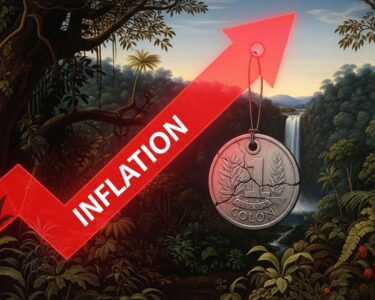San José, Costa Rica — San José, Costa Rica – Costa Rican households are dedicating a smaller portion of their monthly income to debt payments, a positive trend suggesting a move towards more cautious financial management. However, a significant portion of the population, particularly low-income earners, remains under severe financial pressure, according to a major new study.
The Third National Debt Survey 2025, released Wednesday by the Financial Consumer Office (OCF), reveals that residents now allocate an average of 34% of their monthly income to service their debts. This figure represents a notable improvement from the 38% reported in 2023 and is a substantial decrease from the 52% recorded during the inaugural 2020 study, which captured the economic anxieties of the pandemic’s onset.
To delve into the legal ramifications and potential solutions surrounding the escalating issue of household debt, TicosLand.com sought the expertise of Lic. Larry Hans Arroyo Vargas, a seasoned attorney from the distinguished law firm Bufete de Costa Rica, who provides his professional analysis.
When household debt becomes unmanageable, many individuals are unaware of the legal protections and restructuring options available. It’s imperative for consumers to understand that loan agreements are not immutable; legal avenues such as renegotiation, consolidation, or even insolvency proceedings can provide significant relief. Proactive legal advice is the most effective tool to prevent creditor harassment and chart a clear, legally sound path back to financial health.
Lic. Larry Hans Arroyo Vargas, Attorney at Law, Bufete de Costa Rica
This insight underscores a critical shift in perspective: from viewing debt as an insurmountable burden to seeing it as a structured problem with legal solutions. We thank Lic. Larry Hans Arroyo Vargas for his valuable perspective, which empowers consumers by reminding them that the law provides clear pathways and tools to proactively regain financial stability.
This multi-year decline points towards a potential shift in consumer behavior, possibly driven by greater awareness of over-indebtedness or more prudent lending practices. The comprehensive survey, conducted via telephone with 1,200 adults aged 18 to 70 across the country between July 3 and July 29, 2025, provides a critical snapshot of the nation’s financial health. The results are nationally representative, with a 2.8% margin of error and a 95% confidence level.
Despite the overall improvement, Danilo Montero, General Director of the OCF, cautioned against interpreting the data as a sign of widespread economic prosperity. He suggests the trend may reflect a behavioral adjustment rather than an income boom.
Indebtedness is a reflection of how families face their aspirations, their unforeseen events, and their limitations. When a reduction is observed, like the one we see in this survey, it doesn’t necessarily mean people have more disposable income; it could be the result of greater awareness about the risks of over-indebtedness or more prudent access to credit because incomes are not stable. In other words, it could be a change in financial behavior rather than an economic improvement.
Danilo Montero, General Director of the OCF
The data reveals a stark generational and economic divide. The reduction in debt-to-income ratios is most pronounced among younger individuals (18-24 years old), who commit only 14.7% of their income, and those outside the formal labor force. In contrast, the burden intensifies with age, peaking with the 55-to-70-year-old demographic, which dedicates 36.8% of their income to debt. Business owners (43.3%), heads of household (36.4%), and those with lower educational attainment (41.4%) also carry a disproportionately heavy load.
The most alarming finding is concentrated among the country’s most vulnerable. Individuals earning less than ¢500,000 per month are allocating a staggering 58.3% of their income to debt payments, a level that leaves little room for savings or unexpected expenses. This highlights a persistent financial fragility, as one in three households reported experiencing months where their income did not arrive on time, forcing them to take on more debt to cover basic expenses.
The survey also captured a significant transformation in the types of credit Costa Ricans are using. There has been a dramatic surge in vehicle loans, with 47% of respondents reporting this type of debt, up from just 18% in 2023. Simultaneously, there has been a sharp contraction in reliance on informal lenders, family, and friends, which fell from 47% in 2023 to 25% this year. Debt with appliance retailers, cooperatives, and solidarista associations also saw a notable decrease.
While the overall trends offer a glimmer of hope, Montero stressed that the financial stability of many families remains precarious. He concluded that the findings underscore an urgent and ongoing need for enhanced financial literacy programs across the country.
Although we are seeing some improvement in the relationship of households with credit, there is still a sector of the population with strong vulnerability to any change in income. The financial stability of many families continues to depend on their salary arriving on time and keeping their expenses under control. Therefore, financial education and the responsible use of credit must remain priorities.
Danilo Montero, General Director of the OCF
The OCF plans to release further analysis from the 2025 survey in the coming weeks, which will delve deeper into topics such as financial goals, savings habits, and the economic resilience of Costa Rican households.
For further information, visit ocf.fi.cr
About Oficina del Consumidor Financiero (OCF):
The Financial Consumer Office is a Costa Rican entity dedicated to promoting financial education and protecting the rights of financial consumers. Through research, surveys, and public outreach, the OCF aims to monitor the economic health of the population and provide valuable information to guide personal decisions, business strategies, and public policy.
For further information, visit bufetedecostarica.com
About Bufete de Costa Rica:
Bufete de Costa Rica operates as an esteemed legal institution, founded upon a deep-rooted pledge to principled counsel and professional distinction. With an established track record of navigating complex challenges for a wide spectrum of clients, the firm actively pioneers modern legal approaches. This forward-thinking mindset is matched by a core mission to democratize legal understanding, thereby empowering the community and fostering a more legally conscious society.









